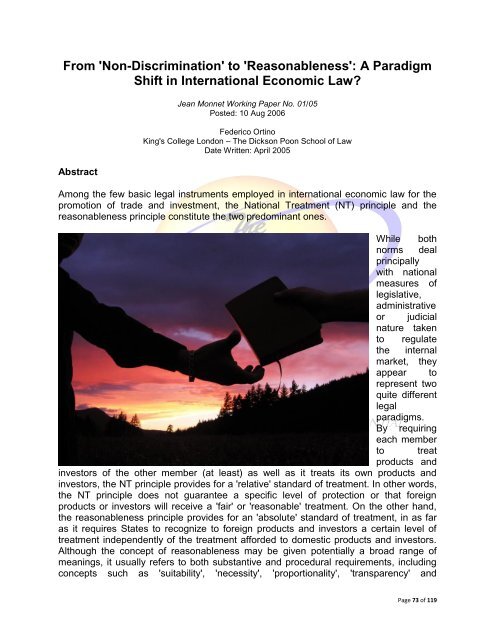International Legal Evangelism: Intelligence, Reconnaissance & Missions
International Legal Evangelism: Intelligence, Reconnaissance & Missions
International Legal Evangelism: Intelligence, Reconnaissance & Missions
You also want an ePaper? Increase the reach of your titles
YUMPU automatically turns print PDFs into web optimized ePapers that Google loves.
From 'Non-Discrimination' to 'Reasonableness': A Paradigm<br />
Shift in <strong>International</strong> Economic Law?<br />
Abstract<br />
Jean Monnet Working Paper No. 01/05<br />
Posted: 10 Aug 2006<br />
Federico Ortino<br />
King's College London – The Dickson Poon School of Law<br />
Date Written: April 2005<br />
Among the few basic legal instruments employed in international economic law for the<br />
promotion of trade and investment, the National Treatment (NT) principle and the<br />
reasonableness principle constitute the two predominant ones.<br />
While both<br />
norms deal<br />
principally<br />
with national<br />
measures of<br />
legislative,<br />
administrative<br />
or judicial<br />
nature taken<br />
to regulate<br />
the internal<br />
market, they<br />
appear to<br />
represent two<br />
quite different<br />
legal<br />
paradigms.<br />
By requiring<br />
each member<br />
to treat<br />
products and<br />
investors of the other member (at least) as well as it treats its own products and<br />
investors, the NT principle provides for a 'relative' standard of treatment. In other words,<br />
the NT principle does not guarantee a specific level of protection or that foreign<br />
products or investors will receive a 'fair' or 'reasonable' treatment. On the other hand,<br />
the reasonableness principle provides for an 'absolute' standard of treatment, in as far<br />
as it requires States to recognize to foreign products and investors a certain level of<br />
treatment independently of the treatment afforded to domestic products and investors.<br />
Although the concept of reasonableness may be given potentially a broad range of<br />
meanings, it usually refers to both substantive and procedural requirements, including<br />
concepts such as 'suitability', 'necessity', 'proportionality', 'transparency' and<br />
Page 73 of 119

















